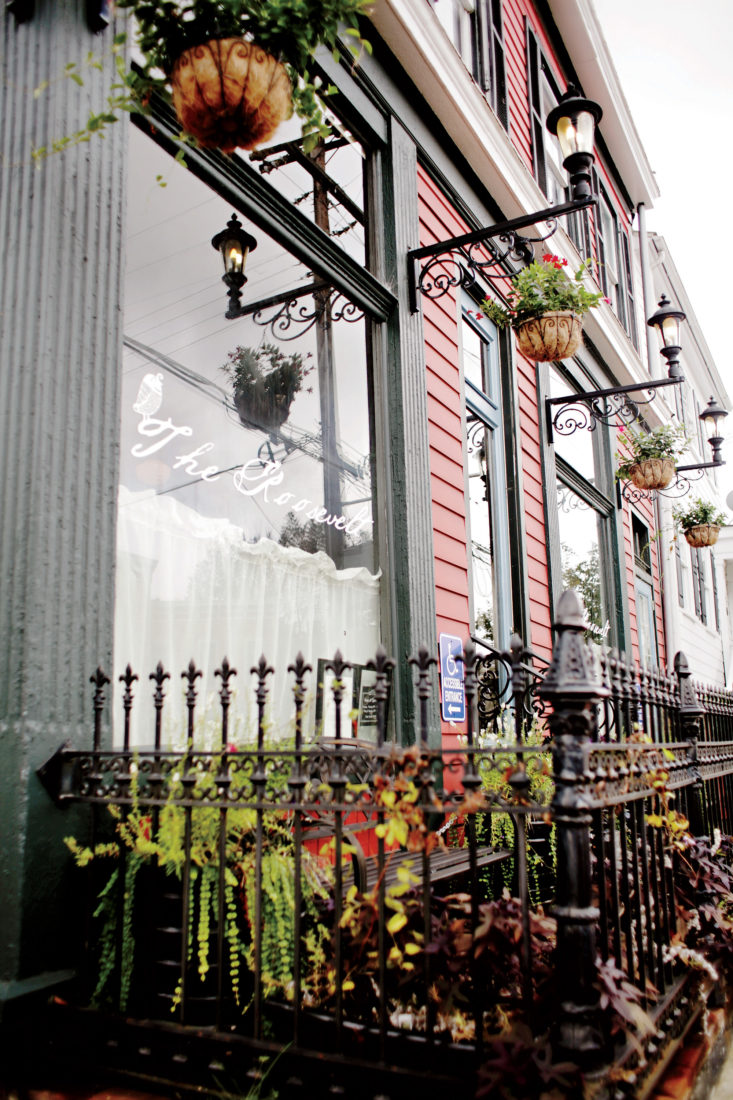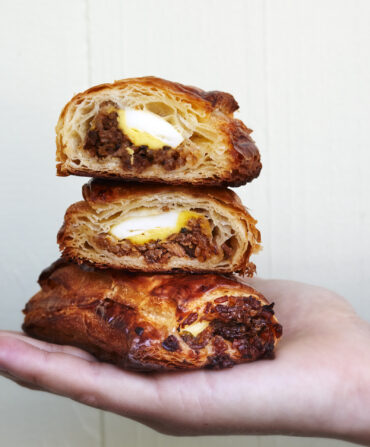The Roosevelt, a year-and-a-half-old restaurant in Richmond, Virginia’s Church Hill neighborhood, does right by skins. Chicken skins, scalped of their fat, fried hard and lavishly sauced. Pig skins, trimmed into curls and oil poached until they swell like Cheetos. And trout skins, still wrapped around trout fillets, sautéed skin-down until they straddle the ditch between pliant and brittle, garnished with a turmeric-spiked sunchoke relish.
 Lee Gregory, a South Carolina native with a reverence for the Lowcountry, is the chef behind the skins. Kendra Feather, an ascendant Richmond entrepreneur with four food businesses in her portfolio, coined the moniker and curated the vibe.
Lee Gregory, a South Carolina native with a reverence for the Lowcountry, is the chef behind the skins. Kendra Feather, an ascendant Richmond entrepreneur with four food businesses in her portfolio, coined the moniker and curated the vibe.
The space—pressed tin ceiling, flocked floral wallpaper, bentwood chairs, and, at the back of the rectangle, a dogleg bar spangled by a black glass chandelier—evokes a pre–World War II South. Back when Franklin D. Roosevelt was in the White House. Back when America grappled with the Great Depression. Back when writers from Roosevelt’s Works Progress Administration traveled the country, documenting culinary culture for the America Eats project.
Feather, who combed the America Eats archive for inspiration, argues that the Depression was the last era Americans really ate locally. Back then, she says, we had no choice. Lucky for us, the Roosevelt team did not extend that metaphor to construct some virtuous 100-mile-diet menu. Their definition of local is broad. And generous. While most of the garden goods come from local farmers, they source trout from North Carolina, polenta from South Carolina, ham from Tennessee, and vodka from Mississippi.
The wine list, on the other hand, is agreeably conscribed. In a bold move that should set regional standards, Feather assembled an all-Virginia roster of thirty-plus bottles—Jefferson Viognier, Ox-Eye Dry Riesling, Linden Hardscrabble Red among them— that telegraph that Southern enology has arrived. The bar, tended by Thomas “T” Leggett, also pays deference to Virginia goods, including Catoctin Creek Roundstone Rye, a leathery whiskey from Loudoun County. Gregory, meanwhile, stands tall in the galley kitchen. While the Bottle Rockets and the Drive-By Truckers blast, he deep-fries sugar toads, known in some circles as swelling toads. Sourced from the Chesapeake Bay, served fin-up, swimming in a sea of malted tartar sauce, they look like albino goldfish and taste as sweet as day-boat flounder.
Gregory, meanwhile, stands tall in the galley kitchen. While the Bottle Rockets and the Drive-By Truckers blast, he deep-fries sugar toads, known in some circles as swelling toads. Sourced from the Chesapeake Bay, served fin-up, swimming in a sea of malted tartar sauce, they look like albino goldfish and taste as sweet as day-boat flounder.
No matter the dish, Gregory cooks with a crooked smile. Steak tartare gets a garland of charcoal vinaigrette. Swordfish bobs in a pork jus, pocked with chorizo coins and butterbeans. Poutine, that Quebecois gut punch of fries, gravy, and curds, gets reinterpreted as shoestrings, napped with ham-fat gravy and capped with pimento cheese.
The man also knows how to close out a meal. At the bottom of the menu, he lists just a few desserts, all priced at five dollars, including Coca-Cola cake, pecan pie, and—that specialty of my great-aunt and yours—foie gras pound cake. The formula is simple: Replace half the butter in a traditional recipe with a puree of fattened goose liver. The result, served with a scoop of caramel ice cream, is just this side of subtle and way on the other side of delicious.
MUST EATS
Three Richmond spots where women rule the roost
Ingrid’s Bakery
Sweet potato biscuits, overstuffed peach turnovers, and butter-filigreed croissants are stocks-in-trade at Ingrid Allen’s bungalow. ingridsbakery.com
Sally Bell’s Kitchen
Locals may tell you that the deviled eggs and orange cupcakes aren’t what they used to be at this takeaway, founded in 1924 by Elizabeth Lee Milton and Sallie Cabell Jones. They’re wrong. sallybellskitchen.com
Stella’s
Proprietor Stella
Dikos serves impossibly flaky spanakopita, and—because this is Virginia—luncheon bowls of Brunswick stew. stellasrichmond.com
John T. Edge, writer and host of the television show TrueSouth, began contributing to Garden & Gun in its first year of publication. He is the author of The Potlikker Papers: A Food History of the Modern South and House of Smoke.








